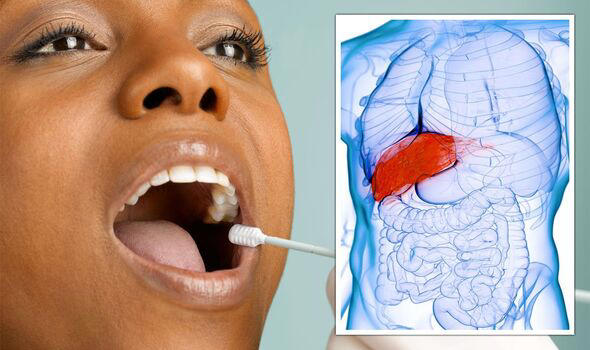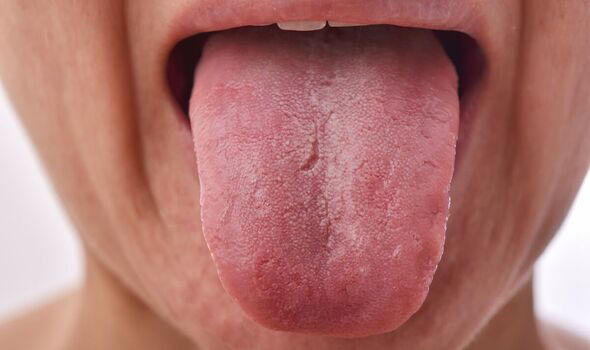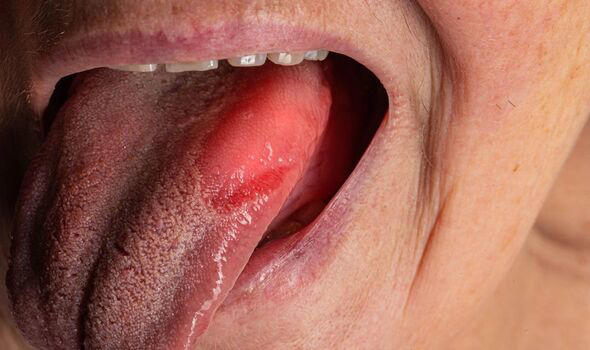'Liver transplant candidates' often report one of two symptoms on their tongue - study















'Liver transplant candidates' often report one of two symptoms on their tongue - study
Liver disease can be broken down into several stages. In the cirrhotic phase of the condition, the liver function becomes severely compromised due to scarring. This final phase is when most patients require a transplant and report two changes in the texture of their tongue.
In 2022 the Dentistry Journal of Basel probed the link between chronic liver disease and oral health to identify which oral manifestations characterise cirrhosis.
"A fissured tongue is common in dry mouth and its prevalence in liver disease is around 30 to 40 percent," noted the authors.
A dry mouth is an established feature of liver disease, with patients often reporting dryness of the eyes as well.
The authors explained that a "smooth atrophic tongue is typical in alcohol-related liver disease."
They added: "Fissured tongue and atrophic tongue were significantly associated with hypo salivation in the study of 300 liver transplant candidates," added the authors.
A fissured tongue describes the finding of small furrows and grooves on the surface of the muscle.
The American Academy of Oral Medicine states that these fissures can be shallow or deep, single or multiple.
It adds that "often there is a prominent fissure in the centre of the tongue."
When this occurs the tongue tends to look smooth and glossy, explains the Cleveland Clinic.
In most cases, vitamin deficiencies are found to be the cause of atrophy of the tongue, particularly deficiencies in vitamin B12.
Changes in tongue texture are also common indications of dehydration and dry mouth, however.
It's been stated in several research papers that the saliva flow rate is significantly lower in patients in the cirrhotic stages of liver disease.
Science Directs states that in alcoholic liver disease, the flow rate of saliva is reduced by a staggering 50 percent.
This problem occurs in roughly 50 percent of patients with the condition due to enlargement of the parotid glands.
Other oral signs of liver disease
Advanced liver disease may also promote oral candidiasis - also known as oral thrush - a condition in which fungus accumulates on the tongue.
Mayo Clinic explains: "Oral thrust causes creamy white lesions, usually on your tongue or inner cheeks.
"Sometimes oral thrust may spread to the roof of your mouth, your gums or tonsils or the back of your throat."
Studies have shown that alcohol-dependent patients at all stages of liver disease have dramatic overgrowths of the fungus associated with oral thrust.
Individuals who experience the above symptoms persistently are advised to see a doctor for advice.
Watermelon: Expert opinions, health risks, and more

















Watermelon: Expert opinions, health risks, and more
Perspective from Leticia Soares
Postgraduate Degree in Public and Family Health/Bachelor Degree in Nutrition and Dietetics · 5 years of experience · Brazil
Benefits
- Watermelon provides hydration. About 92% of watermelon composition is water. In addition to drinking plenty of water, consuming water-rich foods is a great way to keep your body well hydrated.
- Watermelon can be a cardiovascular health protector. In a study it was showed that the consumption of watermelon in daily basis can help with reductions in body weight, body mass index, waist-hip ratio and blood pressure.
Watermelon has anti-oxidant properties. The fruit is a valuable source of phytochemicals with high nutritional properties. Watermelon can be considered an excellent functional food due to its rich lycopene, vitamin A and vitamin C contents. The intake of watermelon as a snake or beverage has the antioxidant potential and helps in the improvement of cell signalling, adhesion and other important biological activities.
- Watermelon has anticancer properties. The red colors of watermelon are due to the presence of carotenoids, such as lycopene and beta-carotene. The lycopene is an active component of watermelon and it can act in the modulation of cancer development by the inhibition of DNA mutation.
Possible Side Effects
- Eating watermelon in excessive amounts can lead to some intestinal discomfort. Watermelon is a high FODMAP fruit and when consumed in large portions it can cause symptoms like bloating, constipation, diarrhea and pain.
Perspective from Lucía Ramos
Bachelor of Science (Nutrition) · 8 years of experience · Argentina
Benefits
- Watermelon helps in weight loss. Watermelon contains fiber and has low range of kilocalories. Every 100 grams it provides 30 kilocalories, about 0,4 grams of fiber and a high percent of water.
Possible Side Effects
- Diabetic subjects should control the portion of watermelon for its sugar content and its impact on blood glucose.
Doctors warn of 'tech neck' - which could even require surgery
















Doctors warn of 'tech neck' - which could even require surgery
Staring at your phone screen for hours each day could cause so much neck damage it requires surgery.
Called 'tech neck', experts warn the repeated strain on the bones, nerves and muscles can cause chronic pain. Muscle stiffness, joint inflammation, pinched nerves, arthritis, and even bone spurs or herniated discs can also occur.
Americans spend an average of more than five hours scrolling on their smartphone each day, according to the University of Texas Southwestern, plus even more time staring at laptop and computer screens.
The normal adult head weighs 10-12 pounds, and tipping it forward at a 45-degree angle to stare at a cellphone increases the amount of force on the neck by almost 50 pounds.
Phones and social media are an integral part of modern life and many jobs require extra screen time on computers, leading to significant effects on physical and mental health.
Dr Kavita Trivedi, associate professor of physical medicine and rehabilitation at the University of Texas Southwestern, said: 'Humans are upright creatures, and our bodies aren’t designed to look down for long periods of time, which puts extra pressure on the cervical spine.
She explained that when consistently staring downwards, the extra 50 pound force can strain or injure the joints that connect the vertebrae.
The more you tilt down, the heavier the pressure, with a 60 degree bend equivalent to 60 pounds.
Surrounding muscles will tighten up in an attempt to protect nearby nerves, in turn causing inflammation, pain and knots in the neck.
It is increasingly affecting teens and young people, as more and more children get smartphones at earlier ages.
Nonsurgical treatment options include medication and physical therapy, trigger point and steroid injections as well as nerve blocks.
In the worst cases, patients may require surgery.
A 'neck lift' involves incisions around the ears and hairline to tighten underlying muscle and remove excess skin.
It is typically a safe procedure with no more risks than any other surgery.
Holding your phone at eye level will help to reduce the strain and can prevent future pain and neck issues.
Dr Trivedi said: 'The good news is that most patients with tech neck don’t require surgery, and we have a wide range of therapies that can be very effective. There’s no need to live with pain if it can be treated.'
She added: 'Our phones and tablets are valuable tools, and there’s no need to give them up. The solution is to learn how to prevent tech neck while using these devices, and if pain develops, see a specialist who can help.'
A 2008 literature review found that those who sit in an office and computer users were most at risk of neck pain out of all workers.
And a report by Data.ai found that humans spent a combined 4.1trillion hours - or 470million years - staring at their phone screens in 2022.
Frequent use of smartphones has been linked to many potential harms aside from tech neck.
A 2017 study by Turkish researchers found that university students who were addicted to their phones are more likely to suffer from loneliness or aggression.
With loneliness comes mental health issues, and a 2021 study by Israeli researchers linked excessive smartphone use to anxiety, depression and related problems such as shyness and low self-esteem.
These participants were also more likely to report poor eating habits, further increasing their risk of suffering dietary conditions.
What is artichoke extract good for? Find out what the experts say












What is artichoke extract good for? Find out what the experts say
Expert opinion from Cassia D Muller
Bechelor in Nutrition · 2 years of experience · Brazil
Studies show that artichoke extract lowers LDL (bad cholesterol) by lowering blood cholesterol levels. This is due to flavonoids (antioxidants) which are the molecules that give the artichoke its purple color and inhibit this health problem.
Expert opinion from Julia Rocha
Bachelor in Nutrition · 3 years of experience · Brazil
Artichoke extract is rich in flavonoids, also known as antioxidants, so it can bring countless health benefits, such as helping to lower LDL, the bad cholesterol, reducing blood cholesterol levels. It also protects the liver from damage and increases the production of bile, which helps in the removal of harmful toxins to this organ.
Expert opinion from Caroline Luiza C. Castro
Master's in Nutrition Sciences · 16 years of experience · Brazil
Artichoke extract is good for reducing low density cholesterol (LDL) in our blood. In addition this extract is an interesting product, being useful in optimize liver detoxification, also helping to reduce body weight and inflammatory conditions.
Articles - Most Read
- Home
- LIVER DIS-EASE AND GALL BLADDER DIS-EASE
- Contacts
- African Wholistics - Medicines, Machines and Ignorance
- African Wholistics -The Overlooked Revolution
- African Holistics - Seduced by Ignorance and Research
- The Children of the Sun-3
- Kidney Stones-African Holistic Health
- The Serpent and the RainBow-The Jaguar - 2
- PART ONE: DIS-EASE TREATMENT AND HEALTH-3
- 'Tortured' and shackled pupils freed from Nigerian Islamic school
- King Leopold's Ghost - Introduction
- PART ONE: DIS-EASE TREATMENT AND HEALTH-4
- PART ONE: DIS-EASE TREATMENT AND HEALTH-2
- PART ONE: DIS-EASE TREATMENT AND HEALTH-5
- African Wholistics - Medicine
- Menopause
- The Black Pharaohs Nubian Pharaohs of Ancient Egypt
- The Mystery System
- PART ONE: DIS-EASE TREATMENT AND HEALTH-6
Who's On Line?
We have 120 guests and no members online
Ad Agency Remote
Articles - Latest
- The Male G Spot Is Real—and It's the Secret to an Unbelievable Orgasm
- Herbs for Parasitic Infections
- Vaginal Care - From Pubes to Lubes: 8 Ways to Keep Your Vagina Happy
- 5 Negative Side Effects Of Anal Sex
- Your Herbs and Spices Might Contain Arsenic, Cadmium, and Lead
- Struggling COVID-19 Vaccines From AstraZeneca, BioNTech/Pfizer, Moderna Cut Incidence Of Arterial Thromboses That Cause Heart Attacks, Strokes, British Study Shows
- Cartilage comfort - Natural Solutions
- Stop Overthinking Now: 18 Ways to Control Your Mind Again
- Groundbreaking method profiles gene activity in the living brain
- Top 5 health benefits of quinoa
- Chromolaena odorata - Jackanna Bush
- Quickly Drain You Lymph System Using Theses Simple Techniques to Boost Immunity and Remove Toxins
- Doctors from Nigeria 'facing exploitation' in UK
- Amaranth, callaloo, bayam, chauli
- 9 Impressive Benefits of Horsetail
- Collagen The Age-Defying Secret Of The Stars + Popular Products in 2025
- Sarcopenia With Aging
- How to Travel as a Senior (20 Simple Tips)
- Everything you need to know about mangosteen






